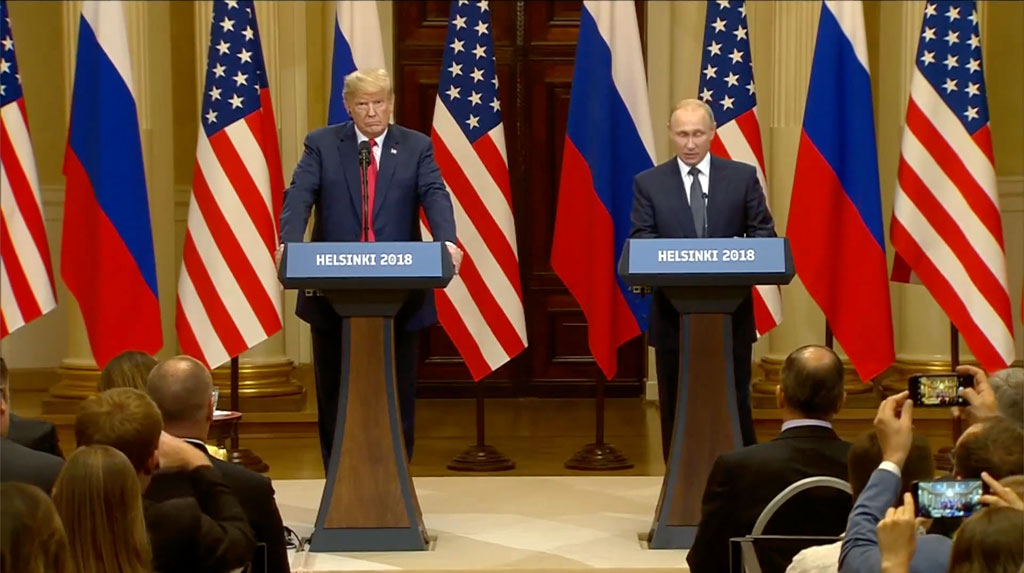Will Trump admit to colluding with Russia? Not if he’s suffering from Kramer Syndrome

President Donald Trump and Russian leader Vladimir Putin hold a press conference Monday after meeting in Helsinki in this screen grab from Guardian News.
Since at least mid-June I’ve been boring friends and family with my revelation that a surprising portion of current events can be illuminated by two models from aging pop culture. Everything from the Iraq War to the madness behind the shootings of Trayvon Martin and the July 7, 2016, ambush of Dallas police officers can be filtered through what I call the Fletcher-Stanwyk Conundrum; the spectacle of President Donald Trump denying collusion (if not outright treason) with Russia falls under a different category.
![]() To explain Trump’s behavior, we have to look at the Seinfeld episode known as “The Pony Remark.”
To explain Trump’s behavior, we have to look at the Seinfeld episode known as “The Pony Remark.”
First seen on television Jan. 30, 1991, as the series’ seventh episode, “The Pony Remark” is remembered by most watchers for Jerry worrying that one of his jokes (“I hate anyone that ever had a pony when they were growing up”) caused an elderly relative’s death. But what’s important here is the episode’s B story, in which eccentric neighbor Kramer declares he’s going to convert his apartment into “levels”:
“I’m getting rid of all my furniture. All of it. And I’m going to build these different levels, with steps, and it’ll all be carpeted with a lot of pillows.”
Jerry and Kramer make a bet over whether Kramer can pull it off: “I know that you can’t, and I’m positive that you won’t,” as Jerry puts it. He’s proven correct when Kramer later tries to call off the bet, explaining that “There’s no bet if I’m not doing it.” That astonishes and outrages Jerry, because “That’s the bet! That you’re not doing it!”
But it’s never clear that Kramer is consciously evading responsibility. Given his generally crackpot lines of reasoning over the years, it’s reasonable to interpret his rejection of fault as a genuine lack of understanding of the principles involved.
And that brings us to Donald Trump. There have been 32 people charged in connection with colluding with Russia to elect Trump in 2016, and five have already pleaded guilty. The investigation by special counsel Robert Mueller has been plodding along for nearly a year and a half, quietly tying a growing daisy chain of perpetrators into a noose that will inevitably tighten around the neck of a president who bas basically already admitted to the crime – in fact, committed one aspect of the crime while being watched by millions of people. And if he hadn’t, his performance Monday with Vladimir Putin in Helsinki would have pretty much done the job for him: He refuted the universal conclusions of U.S. and allied intelligence agencies by explaining that Putin had been “extremely strong and powerful in his denial” of responsibility.
The shock of a U.S. president clearly dancing to the strings of a Russian strongman was too much for even members of his own administration, who, among others, explained the Trump situation as follows to the news site Axios:
“His brain can’t process that collusion and cyberattacks are two different things. Trump seems constitutionally incapable of taking anything Mueller finds seriously … Ego prevents him acknowledging the possibility that any external action could have interfered with his glorious victory.”
That is, having already settled on a narrative about his own greatness – and about the unimportance of objective truth if it doesn’t conform to that narrative – Trump’s mind “can’t process” what collusion is or why people are upset about it. Mueller can present as solid a case as he wants, with documented facts stretching on for thousands of pages and days of testimony, and Trump still will be literally unable to grasp that his work at the behest of Putin is treasonous. There will probably be many of his supporters suffering a similar psychosis, but history will not treat them any more kindly than Kramer’s aborted architectural innovation, the conversation pit.
If “The Pony Remark” and the Kramer Syndrome isn’t a convincing model for this kind of cognitive dissonance, or what it looks like when using it, there’s one remaining pop culture precedent of value: The case of Burns v. Mattingly.


I’d also offer a Presidential precedent, Ronald Reagan acknowledging Iran-Contra while simultaneously saying that he didn’t really believe it. “A few months ago I told the American people I did not trade arms for hostages. My heart and my best intentions still tell me that’s true; but the facts and the evidence tell me it is not.” As weaselly a statement as this is, it’s still head and shoulders above what we get offered these days.